Unit 2 I'll help to clean up the city parks.Section A1a-2d知识点串讲(共有PPT14张)
文档属性
| 名称 | Unit 2 I'll help to clean up the city parks.Section A1a-2d知识点串讲(共有PPT14张) |
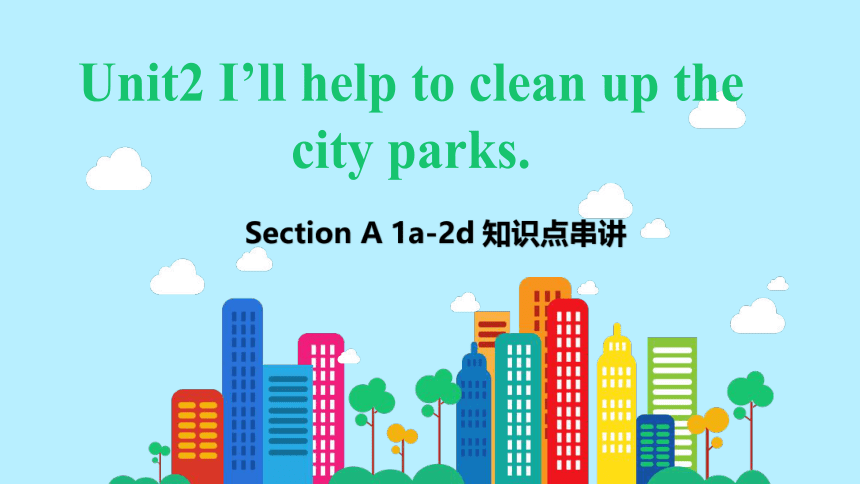
|
|
| 格式 | zip | ||
| 文件大小 | 431.5KB | ||
| 资源类型 | 教案 | ||
| 版本资源 | 人教新目标(Go for it)版 | ||
| 科目 | 英语 | ||
| 更新时间 | 2022-02-21 00:00:00 | ||
图片预览

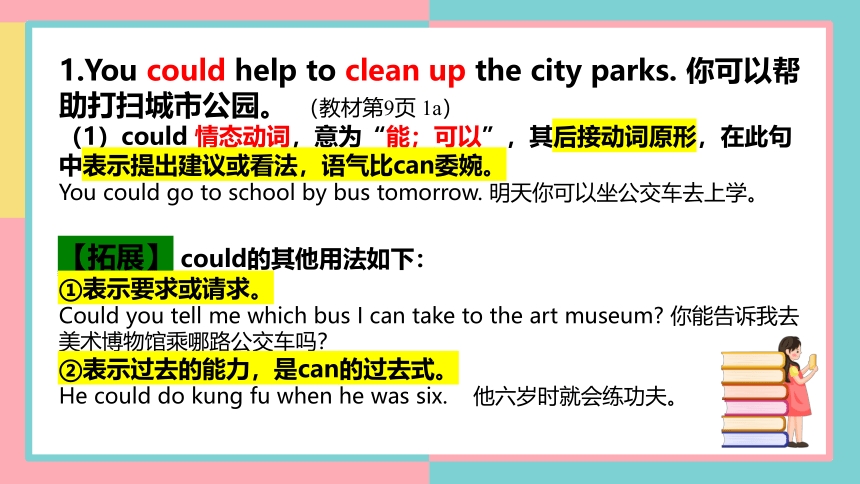
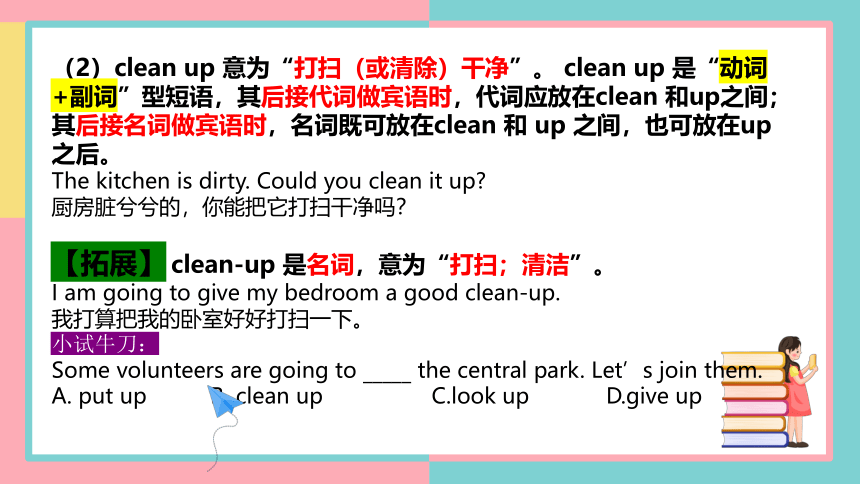
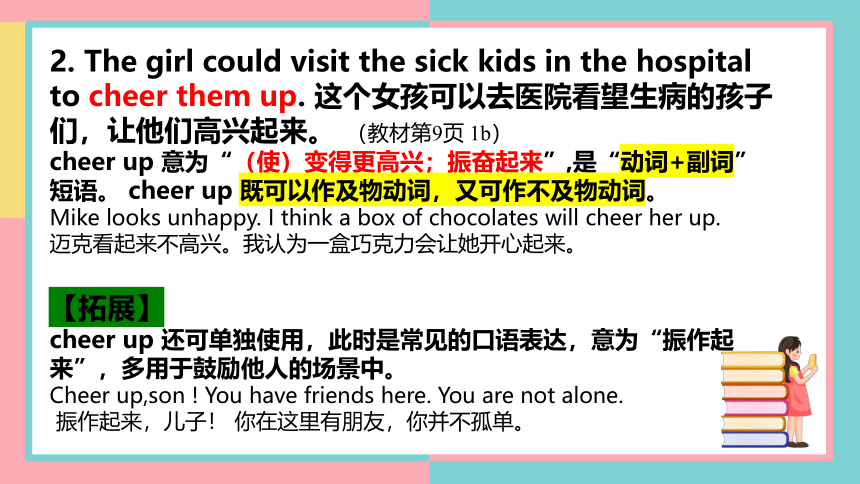

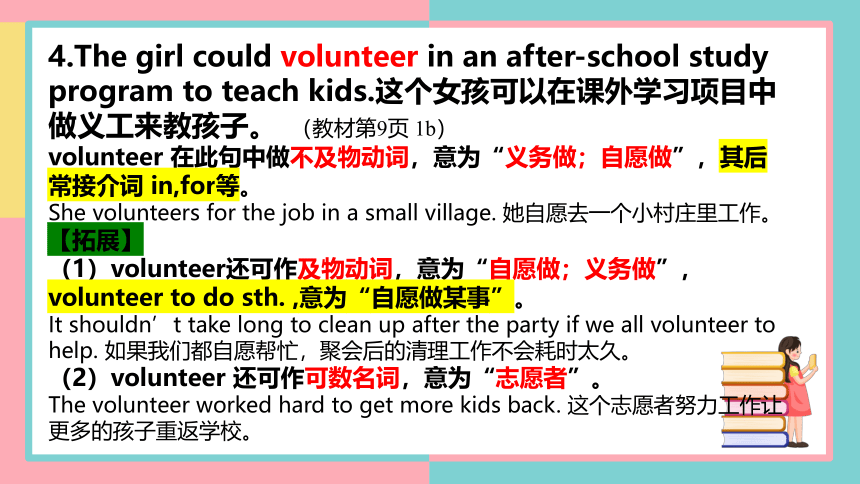

文档简介
(共14张PPT)
Unit2 I’ll help to clean up the city parks.
Section A 1a-2d 知识点串讲
1.You could help to clean up the city parks. 你可以帮助打扫城市公园。 (教材第9页 1a)
(1)could 情态动词,意为“能;可以”,其后接动词原形,在此句中表示提出建议或看法,语气比can委婉。
You could go to school by bus tomorrow. 明天你可以坐公交车去上学。
【拓展】 could的其他用法如下:
①表示要求或请求。
Could you tell me which bus I can take to the art museum 你能告诉我去美术博物馆乘哪路公交车吗?
②表示过去的能力,是can的过去式。
He could do kung fu when he was six. 他六岁时就会练功夫。
(2)clean up 意为“打扫(或清除)干净”。 clean up 是“动词+副词”型短语,其后接代词做宾语时,代词应放在clean 和up之间;其后接名词做宾语时,名词既可放在clean 和 up 之间,也可放在up之后。
The kitchen is dirty. Could you clean it up
厨房脏兮兮的,你能把它打扫干净吗?
【拓展】 clean-up 是名词,意为“打扫;清洁”。
I am going to give my bedroom a good clean-up.
我打算把我的卧室好好打扫一下。
小试牛刀:
Some volunteers are going to _____ the central park. Let’s join them.
A. put up B. clean up C.look up D.give up
2. The girl could visit the sick kids in the hospital to cheer them up. 这个女孩可以去医院看望生病的孩子们,让他们高兴起来。 (教材第9页 1b)
cheer up 意为“(使)变得更高兴;振奋起来”,是“动词+副词”短语。 cheer up 既可以作及物动词,又可作不及物动词。
Mike looks unhappy. I think a box of chocolates will cheer her up.
迈克看起来不高兴。我认为一盒巧克力会让她开心起来。
【拓展】
cheer up 还可单独使用,此时是常见的口语表达,意为“振作起来”,多用于鼓励他人的场景中。
Cheer up,son ! You have friends here. You are not alone.
振作起来,儿子! 你在这里有朋友,你并不孤单。
3. The boy could give out food at the food bank. 这个男孩可以在事物赈济处分发食物。 (教材第9页 1b)
give out 意为“分发;散发”,相当于hand out,是“动词+副词”短语。
Lots of people like to give out Hongbao to each other on Wechat. 很多人喜欢在微信上互相发红包。
【拓展】 give out的其他含义如下:
give out 发出(热、光、声音、气味等) The chemical factory is giving out a bad smell. 这家化工厂正散发出一种难闻的气味。
用完;耗尽 The oil finally gave out. 油最终用完了。
4.The girl could volunteer in an after-school study program to teach kids.这个女孩可以在课外学习项目中做义工来教孩子。 (教材第9页 1b)
volunteer 在此句中做不及物动词,意为“义务做;自愿做”,其后常接介词 in,for等。
She volunteers for the job in a small village. 她自愿去一个小村庄里工作。
【拓展】
(1)volunteer还可作及物动词,意为“自愿做;义务做”,volunteer to do sth. ,意为“自愿做某事”。
It shouldn’t take long to clean up after the party if we all volunteer to help. 如果我们都自愿帮忙,聚会后的清理工作不会耗时太久。
(2)volunteer 还可作可数名词,意为“志愿者”。
The volunteer worked hard to get more kids back. 这个志愿者努力工作让更多的孩子重返学校。
5.We need to come up with a plan to tell people about the city park clean-up. 我们需要想出一个计划来告诉人们关于城市公园大扫除的事。(教材第10页 2b)
come up with 意为“想出;提出(主意、计划、回答等)。
【拓展】 与come 相关的其他短语如下:
come down
下来
come in
进来
come on
快点;加油
come true
实现
come over
过来;来访
come up
走上前来
come from
来自
come out
出来;开花;出版
6.We can’t put off making a plan. 我们不能推迟制定计划。 (教材第10页 2b)
put off 意为”推迟“,是”动词+副词“短语,该短语后接名词、代词、动词-ing形式或till,until引导的时间状语。put off doing sth. 意为”推迟做某事“。
The school put off the sports meeting because of the bad weather. 因为恶劣天气,学校推迟了运动会。
【拓展】与put 相关的其他短语如下:
put away 收起来;放回原处
put up 搭建;张贴;举起
put on 穿上;增加(体重)
put out 熄灭
7.Let’s make some notices,too. 我们也制作一些通告吧。 ( 教材第10页 2b)
notice 在此句中作可数名词,意为“通知;通告”。
We wouldn’t put up the notice on the gate. It’s against the rules. 我们不应该把通知贴在门上,这违反规定。
【拓展】
(1)notice 还可作不可数名词,意为”注意“。
I hope you will take notice of what I’m going to tell you. 我希望你注意我接下来来对你讲的话。
(2) notice 也可做动词,意为“注意到;意识到”。常见用法如下:
notice notice sb. do/doing sth. 注意到某人做了/正在做某事 He didn’t notice his sister enter the room. 他没注意他姐姐进了房间。
notice +that 从句 注意到...... He noticed that she was angry. 他注意到她生气了。
8.We could each call up 10 students and ask them to come. 我们每个人可以给10名学生打电话并邀请他们来。( 教材第10页 2b)
call up 在此句中意为“打电话给(某人)”,是“动词+副词”短语。
Every time I’m in New York,I’ll call him up.
每次我在纽约,都会给他打电话。
【拓展】
call up 还可意为“征召”。
He was called up when he was 18 years old.
他18岁时被征召入伍了。
9.They told me stories about the past and how things used to be. 他们给我讲过去的生活经历,讲过去是什么样子的。( 教材第10页 2b)
used to 意为“曾经......;过去......”,表示过去存在的某种状态或过去某种经常性、习惯性的动作,并意味着这种情况目前已不复存在。 to 为不定时符号,其后接动词原形。 used to 的否定形式为didn’t use to 或 used not to (usedn’t to)。
Our city is cleaner than it used to be. 我们的城市比以前更干净了。
I didn’t use to sleep very well,but then I started doing yoga and it really helps. 我过去常睡不好,但后来我开始练瑜伽,这真的有助于睡眠。
【拓展】 be/get used to (doing)sth. 意为“习惯(做)某事”,其中to 是介词。
Linda is used to living in China. 琳达习惯了在中国生活。
10. Yeah,a lot of people are lonely. 是的,许多老人都很孤独。 ( 教材第10页 2b)
lonely 形容词,意为“孤独的;寂寞的”,多指情感上的孤独,常在句中做表语。
When she got to the new school,she felt very lonely.
当她到达新学校时,她感到非常孤独。
【拓展】 lonely 做形容词,还可意为“偏僻的;荒凉的;人迹罕至的”,常在句中作定语。
At a dark night, a man came to a lonely village.
在一个漆黑的夜晚,一个男人来到了一个偏僻的村庄。
【辨析】 lonely 与 alone
lonely 形容词 孤独的;寂寞的 常做表语,也可做定语,强调内心的孤独,带有浓厚的感彩。
alone 副词 独自;单独地 常做方式状语,修饰动词,相当于by oneself.
形容词 独自的;单独的 在句中做表语,不含感彩,表示客观状况
11.We should listen to them and care for them. 我们应该倾听他们,并照顾他们。( 教材第10页 2b)
care for 意为“照顾;照料”。= take care of 或 look after
He is old enough to care for himself.
他已经足够大了,可以照顾好自己了。
【拓展】
(1)care for 还可意为“非常喜欢”,常用于否定句或疑问句中。
He didn’t much care for her friends. 他不太喜欢她的朋友。
(2)与 care 相关的其他短语如下:
take care 当心;小心 care about 关心;在意
under the care of 在......的照顾下 take care of 照顾
Thanks
cute
sweet
delicious
Food
Unit2 I’ll help to clean up the city parks.
Section A 1a-2d 知识点串讲
1.You could help to clean up the city parks. 你可以帮助打扫城市公园。 (教材第9页 1a)
(1)could 情态动词,意为“能;可以”,其后接动词原形,在此句中表示提出建议或看法,语气比can委婉。
You could go to school by bus tomorrow. 明天你可以坐公交车去上学。
【拓展】 could的其他用法如下:
①表示要求或请求。
Could you tell me which bus I can take to the art museum 你能告诉我去美术博物馆乘哪路公交车吗?
②表示过去的能力,是can的过去式。
He could do kung fu when he was six. 他六岁时就会练功夫。
(2)clean up 意为“打扫(或清除)干净”。 clean up 是“动词+副词”型短语,其后接代词做宾语时,代词应放在clean 和up之间;其后接名词做宾语时,名词既可放在clean 和 up 之间,也可放在up之后。
The kitchen is dirty. Could you clean it up
厨房脏兮兮的,你能把它打扫干净吗?
【拓展】 clean-up 是名词,意为“打扫;清洁”。
I am going to give my bedroom a good clean-up.
我打算把我的卧室好好打扫一下。
小试牛刀:
Some volunteers are going to _____ the central park. Let’s join them.
A. put up B. clean up C.look up D.give up
2. The girl could visit the sick kids in the hospital to cheer them up. 这个女孩可以去医院看望生病的孩子们,让他们高兴起来。 (教材第9页 1b)
cheer up 意为“(使)变得更高兴;振奋起来”,是“动词+副词”短语。 cheer up 既可以作及物动词,又可作不及物动词。
Mike looks unhappy. I think a box of chocolates will cheer her up.
迈克看起来不高兴。我认为一盒巧克力会让她开心起来。
【拓展】
cheer up 还可单独使用,此时是常见的口语表达,意为“振作起来”,多用于鼓励他人的场景中。
Cheer up,son ! You have friends here. You are not alone.
振作起来,儿子! 你在这里有朋友,你并不孤单。
3. The boy could give out food at the food bank. 这个男孩可以在事物赈济处分发食物。 (教材第9页 1b)
give out 意为“分发;散发”,相当于hand out,是“动词+副词”短语。
Lots of people like to give out Hongbao to each other on Wechat. 很多人喜欢在微信上互相发红包。
【拓展】 give out的其他含义如下:
give out 发出(热、光、声音、气味等) The chemical factory is giving out a bad smell. 这家化工厂正散发出一种难闻的气味。
用完;耗尽 The oil finally gave out. 油最终用完了。
4.The girl could volunteer in an after-school study program to teach kids.这个女孩可以在课外学习项目中做义工来教孩子。 (教材第9页 1b)
volunteer 在此句中做不及物动词,意为“义务做;自愿做”,其后常接介词 in,for等。
She volunteers for the job in a small village. 她自愿去一个小村庄里工作。
【拓展】
(1)volunteer还可作及物动词,意为“自愿做;义务做”,volunteer to do sth. ,意为“自愿做某事”。
It shouldn’t take long to clean up after the party if we all volunteer to help. 如果我们都自愿帮忙,聚会后的清理工作不会耗时太久。
(2)volunteer 还可作可数名词,意为“志愿者”。
The volunteer worked hard to get more kids back. 这个志愿者努力工作让更多的孩子重返学校。
5.We need to come up with a plan to tell people about the city park clean-up. 我们需要想出一个计划来告诉人们关于城市公园大扫除的事。(教材第10页 2b)
come up with 意为“想出;提出(主意、计划、回答等)。
【拓展】 与come 相关的其他短语如下:
come down
下来
come in
进来
come on
快点;加油
come true
实现
come over
过来;来访
come up
走上前来
come from
来自
come out
出来;开花;出版
6.We can’t put off making a plan. 我们不能推迟制定计划。 (教材第10页 2b)
put off 意为”推迟“,是”动词+副词“短语,该短语后接名词、代词、动词-ing形式或till,until引导的时间状语。put off doing sth. 意为”推迟做某事“。
The school put off the sports meeting because of the bad weather. 因为恶劣天气,学校推迟了运动会。
【拓展】与put 相关的其他短语如下:
put away 收起来;放回原处
put up 搭建;张贴;举起
put on 穿上;增加(体重)
put out 熄灭
7.Let’s make some notices,too. 我们也制作一些通告吧。 ( 教材第10页 2b)
notice 在此句中作可数名词,意为“通知;通告”。
We wouldn’t put up the notice on the gate. It’s against the rules. 我们不应该把通知贴在门上,这违反规定。
【拓展】
(1)notice 还可作不可数名词,意为”注意“。
I hope you will take notice of what I’m going to tell you. 我希望你注意我接下来来对你讲的话。
(2) notice 也可做动词,意为“注意到;意识到”。常见用法如下:
notice notice sb. do/doing sth. 注意到某人做了/正在做某事 He didn’t notice his sister enter the room. 他没注意他姐姐进了房间。
notice +that 从句 注意到...... He noticed that she was angry. 他注意到她生气了。
8.We could each call up 10 students and ask them to come. 我们每个人可以给10名学生打电话并邀请他们来。( 教材第10页 2b)
call up 在此句中意为“打电话给(某人)”,是“动词+副词”短语。
Every time I’m in New York,I’ll call him up.
每次我在纽约,都会给他打电话。
【拓展】
call up 还可意为“征召”。
He was called up when he was 18 years old.
他18岁时被征召入伍了。
9.They told me stories about the past and how things used to be. 他们给我讲过去的生活经历,讲过去是什么样子的。( 教材第10页 2b)
used to 意为“曾经......;过去......”,表示过去存在的某种状态或过去某种经常性、习惯性的动作,并意味着这种情况目前已不复存在。 to 为不定时符号,其后接动词原形。 used to 的否定形式为didn’t use to 或 used not to (usedn’t to)。
Our city is cleaner than it used to be. 我们的城市比以前更干净了。
I didn’t use to sleep very well,but then I started doing yoga and it really helps. 我过去常睡不好,但后来我开始练瑜伽,这真的有助于睡眠。
【拓展】 be/get used to (doing)sth. 意为“习惯(做)某事”,其中to 是介词。
Linda is used to living in China. 琳达习惯了在中国生活。
10. Yeah,a lot of people are lonely. 是的,许多老人都很孤独。 ( 教材第10页 2b)
lonely 形容词,意为“孤独的;寂寞的”,多指情感上的孤独,常在句中做表语。
When she got to the new school,she felt very lonely.
当她到达新学校时,她感到非常孤独。
【拓展】 lonely 做形容词,还可意为“偏僻的;荒凉的;人迹罕至的”,常在句中作定语。
At a dark night, a man came to a lonely village.
在一个漆黑的夜晚,一个男人来到了一个偏僻的村庄。
【辨析】 lonely 与 alone
lonely 形容词 孤独的;寂寞的 常做表语,也可做定语,强调内心的孤独,带有浓厚的感彩。
alone 副词 独自;单独地 常做方式状语,修饰动词,相当于by oneself.
形容词 独自的;单独的 在句中做表语,不含感彩,表示客观状况
11.We should listen to them and care for them. 我们应该倾听他们,并照顾他们。( 教材第10页 2b)
care for 意为“照顾;照料”。= take care of 或 look after
He is old enough to care for himself.
他已经足够大了,可以照顾好自己了。
【拓展】
(1)care for 还可意为“非常喜欢”,常用于否定句或疑问句中。
He didn’t much care for her friends. 他不太喜欢她的朋友。
(2)与 care 相关的其他短语如下:
take care 当心;小心 care about 关心;在意
under the care of 在......的照顾下 take care of 照顾
Thanks
cute
sweet
delicious
Food
同课章节目录
- Unit 1 What's the matter?
- Section A
- Section B
- Unit 2 I'll help to clean up the city parks.
- Section A
- Section B
- Unit 3 Could you please clean your room?
- Section A
- Section B
- Unit 4 Why don't you talk to your parents?
- Section A
- Section B
- Unit 5 What were you doing when the rainstorm came
- Section A
- Section B
- Review of Units 1-5
- Unit 6 An old man tried to move the mountains.
- Section A
- Section B
- Unit 7 What's the highest mountain in the world?
- Section A
- Section B
- Unit 8 Have you read Treasure Island yet?
- Section A
- Section B
- Unit 9 Have you ever been to a museum?
- Section A
- Section B
- Unit 10 I've had this bike for three years.
- Section A
- Section B
